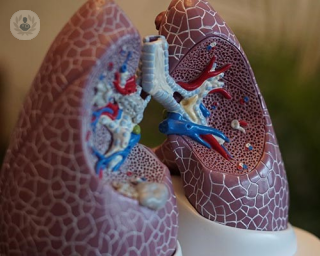What is pleural effusion?
Around the lungs, there is a thin membrane called the pleural. Usually, there is a small amount of fluid in this space but if excess fluid builds up, this is known as pleural effusion. It is also referred to as ‘water on the lungs.’ It limits the space the lungs can expand into while breathing in, forcing the patient to take shallow breaths.

What are the different types of pleural effusion?
Pleural effusion is divided into two types:
Transudative
The excess fluid is similar to normal pleural fluid and rarely needs to be treated unless there is a very high amount. It is usually caused by congestive heart failure.
Exudative
Proteins, blood, inflammatory cells and even bacteria may leak along with fluid from damaged blood cells into the pleural space. It may cause inflammation or other problems. This type can be caused by lung cancer and pneumonia.
What causes pleural effusion?
Pleural effusion can be caused by a wide range of things:
- Fluid from nearby organs: fluid can leak from other organs and become trapped in the pleural cavity. Conditions such as congestive heart failure (in which the heart doesn’t pump blood around the body properly), liver disease, and kidney disease can all lead to this.
- Cancer: typically, lung cancer, but metastases of other cancers can come at the lung too.
- Infections: tuberculosis, pneumonia, etc.
- Pulmonary embolism
- Autoimmune conditions: lupus, rheumatoid arthritis
- Complication of surgery
What are the symptoms of pleural effusion?
Common symptoms of pleural effusion include:
- chest pain
- dry coughing
- breathing problems or difficulties
- fever
Some patients may be asymptomatic and the fluid might be found during investigation for another reason.
How is pleural effusion diagnosed?
A number of tests can be performed to diagnose pleural effusion, such as:
- chest x-rays
- CT scan of the chest
- ultrasound of the chest
Will a pleural effusion go away on its own?
If the pleural effusion is not causing any problems or there isn't too much liquid, it may not require treatment. In cases of minor pleural effusion, it will usually clear up by itself.
How is pleural effusion treated?
If there is a large amount of fluid built up and/or causing problematic symptoms, the fluid can be drained, either by a needle (thoracentesis), by a tube inserted into a hole the doctor has made in the patient’s chest wall (tube thoracostomy), or by a long-term catheter if the patient suffers recurrent pleural effusions, so that they can be drained when they occur.
In some cases, surgical intervention may be necessary to deal with inflammation or unhealthy tissue in the pleural cavity.
Pleural effusion
Ms Emma Beddow - Cardiothoracic surgery
Created on: 11-13-2012
Updated on: 07-31-2023
Edited by: Lauren Dempsey
What is pleural effusion?
Around the lungs, there is a thin membrane called the pleural. Usually, there is a small amount of fluid in this space but if excess fluid builds up, this is known as pleural effusion. It is also referred to as ‘water on the lungs.’ It limits the space the lungs can expand into while breathing in, forcing the patient to take shallow breaths.

What are the different types of pleural effusion?
Pleural effusion is divided into two types:
Transudative
The excess fluid is similar to normal pleural fluid and rarely needs to be treated unless there is a very high amount. It is usually caused by congestive heart failure.
Exudative
Proteins, blood, inflammatory cells and even bacteria may leak along with fluid from damaged blood cells into the pleural space. It may cause inflammation or other problems. This type can be caused by lung cancer and pneumonia.
What causes pleural effusion?
Pleural effusion can be caused by a wide range of things:
- Fluid from nearby organs: fluid can leak from other organs and become trapped in the pleural cavity. Conditions such as congestive heart failure (in which the heart doesn’t pump blood around the body properly), liver disease, and kidney disease can all lead to this.
- Cancer: typically, lung cancer, but metastases of other cancers can come at the lung too.
- Infections: tuberculosis, pneumonia, etc.
- Pulmonary embolism
- Autoimmune conditions: lupus, rheumatoid arthritis
- Complication of surgery
What are the symptoms of pleural effusion?
Common symptoms of pleural effusion include:
- chest pain
- dry coughing
- breathing problems or difficulties
- fever
Some patients may be asymptomatic and the fluid might be found during investigation for another reason.
How is pleural effusion diagnosed?
A number of tests can be performed to diagnose pleural effusion, such as:
- chest x-rays
- CT scan of the chest
- ultrasound of the chest
Will a pleural effusion go away on its own?
If the pleural effusion is not causing any problems or there isn't too much liquid, it may not require treatment. In cases of minor pleural effusion, it will usually clear up by itself.
How is pleural effusion treated?
If there is a large amount of fluid built up and/or causing problematic symptoms, the fluid can be drained, either by a needle (thoracentesis), by a tube inserted into a hole the doctor has made in the patient’s chest wall (tube thoracostomy), or by a long-term catheter if the patient suffers recurrent pleural effusions, so that they can be drained when they occur.
In some cases, surgical intervention may be necessary to deal with inflammation or unhealthy tissue in the pleural cavity.


Pleural effusion: Insights and management
By Dr Gary Davies
2024-11-21
Pleural effusion is a condition that can affect individuals, causing discomfort and potential complications. In his latest online article, Dr Gary Davies explains this condition clearly and helps patients navigate their understanding and management of it. See more


Pleural diseases: your questions answered
By Dr Deepak Rao
2024-11-15
Pleural diseases encompass a range of conditions affecting the pleura, the delicate double-layered membrane enveloping the lungs and lining the chest cavity. These conditions can lead to discomfort, impaired lung function, and, in severe cases, life-threatening complications. Distinguished consultant respiratory physician Dr Deepak Rao answers your commonly asked questions about the world of pleural diseases, shedding light on their types, symptoms, causes, diagnosis, prevention, and available treatment options. See more
Experts in Pleural effusion
-
Ms Emma Beddow
Cardiothoracic surgeryExpert in:
- Lung cancer
- Chest wall tumours
- Pleural mesothelioma
- Mediastinal tumour
- Pneumothorax
- Pleural effusion
-
Mr Kelvin Lau
Cardiothoracic surgeryExpert in:
- Lung cancer
- Chronic obstructive pulmonary disease (COPD)
- Pneumothorax
- Pleural effusion
- Bronchoscopy
- Videothoracoscopy
-
Dr Deepak Rao
Pulmonology & respiratory medicineExpert in:
- Pleural effusion
- Lung cancer
- Bronchoscopy
- Asthma
- Chronic obstructive pulmonary disease (COPD)
- Sleep apnoea
-
Dr Gary Davies
Pulmonology & respiratory medicineExpert in:
- Pleural effusion
- Sleep apnoea
- Aviation medicine
- Asthma
- Chronic cough
- Pneumothorax
-
Mr Andrea Bille
Cardiothoracic surgeryExpert in:
- Lung cancer
- Thymoma
- Pneumothorax
- Pleural effusion
- Pulmonary emphysema
- Pleural mesothelioma
- See all

The Blackheath Hospital - part of Circle Health Group
The Blackheath Hospital - part of Circle Health Group
40-42 Lee Terrace, Blackheath, London SE3 9UD
No existe teléfono en el centro.
By using the telephone number provided by TOP DOCTORS, you automatically agree to let us use your phone number for statistical and commercial purposes. For further information, read our Privacy Policy
Top Doctors

London Bridge Hospital - part of HCA Healthcare
London Bridge Hospital - part of HCA Healthcare
27 Tooley St
No existe teléfono en el centro.
By using the telephone number provided by TOP DOCTORS, you automatically agree to let us use your phone number for statistical and commercial purposes. For further information, read our Privacy Policy
Top Doctors

Private Care at Chelsea and Westminster Hospital
Private Care at Chelsea and Westminster Hospital
Chelsea and Westminster Hospital, 369 Fulham Rd.
No existe teléfono en el centro.
By using the telephone number provided by TOP DOCTORS, you automatically agree to let us use your phone number for statistical and commercial purposes. For further information, read our Privacy Policy
Top Doctors
-
The Blackheath Hospital - part of Circle Health Group
40-42 Lee Terrace, Blackheath, London SE3 9UD, East LondonExpert in:
- Vascular Surgery
- Cardiology
- Bariatric Surgery
- Colorectal surgery
- Endocrine Surgery
- General Surgery
-
London Bridge Hospital - part of HCA Healthcare
27 Tooley St, Central LondonExpert in:
- 24-hour service
- Cardiology
- Minimal access surgery (keyhole surgery)
- Orthopaedic surgery
- Cardiovascular disease
- Gastroenterology
-
Private Care at Chelsea and Westminster Hospital
Chelsea and Westminster Hospital, 369 Fulham Rd., Central LondonExpert in:
- General Surgery
- Dermatology
- Paediatric Dermatology
- Paediatrics
- Preventive paediatrics
- Adult and paediatric services
- See all
- Most viewed diseases, medical tests, and treatments
- Autoimmune diseases
- Minimal access surgery (keyhole surgery)
- Aortic aneurysms
- Long Covid
- Medicolegal
- Robotic surgery
- MRI
- Respiratory failure
- Interventional cardiology
- Sleep disorders







